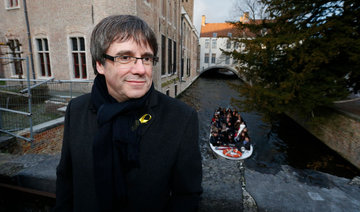BARCELONA: Catalans were anxiously preparing Wednesday for a decisive regional vote, hoping it will help settle the bitter dispute over independence from Spain that has divided their region and rattled Europe.
The election pits leaders of the wealthy northeastern region’s separatist movement against candidates who want to stay part of Spain.
Record turnout is expected but with pro- and anti-independence candidates neck-and-neck in opinion polls, neither side is likely to win a clear majority.
The regional election is being closely watched across EU, still reeling from Britain’s shock decision to leave the bloc, and wary about any breakup of the eurozone’s fourth-largest economy.
The separatist drive has inflamed passions not just in Catalonia but across Spain, with the government in Madrid taking the unprecedented step of stripping the region of its autonomy after its parliament declared independence on October 27.
“I think many positions have become very extreme,” said Assumpta Corell, a 21-year-old university student from the seaside city of Castelldefels who says she will vote for Ciudadanos, the centrist, anti-independence party that is scoring high in opinion polls.
“People who have one opinion will maintain it, people who have a different opinion will continue thinking differently, which is great, but the problem comes when politics play at dividing people even more,” she said.
The election campaign has been tense and often surreal, with axed regional president Carles Puigdemont holding rallies via videolink from exile in Belgium, and his former deputy Oriol Junqueras sending out messages and even poems to supporters from behind bars.
“This is not a normal election,” Puigdemont told supporters Tuesday evening in a final, virtual rally from Belgium.
“What is at stake is not who gets the most votes, but whether the country (Catalonia) or (Spanish Prime Minister Mariano) Rajoy wins” the standoff, he added.
While opinion polls suggest a narrow lead for Junqueras’s leftist, pro-independence ERC, voters could ultimately hand victory to Ciudadanos, whose charismatic candidate Ines Arrimadas has campaigned on a fierce anti-nationalist ticket.
She is fighting to replace Puigdemont, who is wanted by the Spanish courts on charges of sedition, rebellion and misuse of public funds for his role in the independence drive.
“We are very close to making our dream come true,” Arrimadas told supporters at a rally Tuesday in a working-class district of Barcelona.
“We are going to wake up from this nightmare on Thursday,” she added.
But ordinary Catalans on all sides of the divide appeared unsure the election would bring the independence crisis to an end, regardless of who wins.
“I’m anticipating problems, whoever wins,” said Marc Botey, a 47-year-old musician, as he prepared to teach guitar to a student in Poblenou, a former industrial district of Barcelona that has since become hip.
He says he will be voting for the ERC, and hopes that the vote — at the very least — will clarify once and for all how many independence supporters there are in Catalonia.
“We want to know how many we are to be able to decide if it’s worth it,” he said.
With the separatist camp in disarray, secessionists will probably put their independence drive on hold even if they win the vote.
“Even if a pro-independence government is formed it will be very cautious how it acts because it won’t want to lose the restored authority the Catalan government has,” Andrew Dowling, contemporary historian in Hispanic studies at Cardiff University, told AFP.
“It won’t want to see that suspended again,” he said.
The deposed government’s independence declaration prompted more than 3,000 companies to move their headquarters out of the region, and no country has recognized the new “republic.”
The Catalan crisis kicked off in earnest on October 1, when the regional government held a referendum on independence despite a ban by Spain’s Constitutional Court.
The vote was marred by a brutal police crackdown and triggered Spain’s worst political crisis in decades.
Neither separatist nor pro-unity parties are predicted to win a decisive majority in the 135-seat regional parliament, which could lead to lengthy negotiations to form a government.
If parties cannot agree a governing coalition, Catalonia could face elections again next year, prolonging the political uncertainty.
Divided Catalans face moment of truth on independence bid with regional vote
Divided Catalans face moment of truth on independence bid with regional vote

France asks Indonesia to transfer national on death row

- Indonesia has in recent weeks released half a dozen high-profile detainees
- French diplomats have acknowledged that talks were underway for the transfer of Serge Atlaoui
JAKARTA: France has sent Indonesia an official request for the transfer of a French death row inmate who has spent nearly 20 years in prison, an Indonesian minister said on Saturday.
Indonesia has in recent weeks released half a dozen high-profile detainees, including a Filipino mum on death row and the last five members of the so-called “Bali Nine” drug ring.
French diplomats have acknowledged that talks were underway for the transfer of Serge Atlaoui, a 61-year-old Frenchman arrested in 2005 at a drugs factory outside the capital Jakarta.
The Indonesian government has now confirmed it received the official transfer request, which will be discussed in early January.
“We have received a formal letter requesting the transfer of Serge Atlaoui,” senior law and human rights minister Yusril Ihza Mahendra said.
The French embassy in Jakarta declined AFP’s request for comment.
Father-of-four Atlaoui has maintained his innocence, claiming that he was installing machinery in what he thought was an acrylics plant.
He was initially sentenced to life in prison, but the Supreme Court in 2007 increased the sentence to death on appeal.
Atlaoui was held on the island of Nusakambangan in Central Java, known as Indonesia’s “Alcatraz,” following the death sentence, but he was transferred to the city of Tangerang, west of Jakarta, in 2015 ahead of his appeal.
That year, he was due to be executed alongside eight other drug offenders but won a temporary reprieve after Paris stepped up pressure, with Indonesian authorities agreeing to let an outstanding appeal run its course.
In the appeal, Atlaoui’s lawyers argued that then-president Joko Widodo did not properly consider his case as he rejected Atlaoui’s plea for clemency — typically a death row convict’s last chance to avoid the firing squad.
The court, however, upheld its previous decision that it did not have the jurisdiction to hear a challenge over the clemency plea.
Atlaoui’s lawyer, Richard Sedillot, said last month that there was still “considerable hope” for a transfer.
Together Against the Death Penalty (ECPM) said the official request is the “penultimate step in a long fight” for those at the Paris-based organization who have campaigned for years to prevent Atlaoui’s execution.
“We are now waiting for this transfer to become a reality,” ECPM director Raphael Chenuil-Hazan said.
Earlier this month, Filipino inmate Mary Jane Veloso tearfully reunited with her family after nearly 15 years on Indonesia’s death row. She was transferred to a women’s prison in Manila where she awaits a hoped-for pardon for her drugs conviction.
Indonesia has some of the world’s toughest drug laws and has executed foreigners in the past.
At least 530 people were on death row in the Southeast Asian nation, mostly for drug-related crimes, according to data from rights group KontraS, citing official figures.
According to Indonesia’s Immigration and Corrections Ministry, more than 90 foreigners were on death row, all on drug charges, as of early November.
Despite ongoing negotiations for prisoner transfers, the Indonesian government recently signaled that it would resume executions — on hiatus since 2016 — of drug convicts on death row.
India’s former PM Manmohan Singh cremated with state honors

- Singh’s body, draped in Indian flag, was carried through the capital on a flower-decked carriage pulled by a ceremonial army truck
- Modi, who called Singh one of the nation’s ‘most distinguished leaders,’ attended the funeral, along with President Droupadi Murmu
NEW DELHI: The body of Manmohan Singh, the former Indian prime minister whose death has spark outpourings of grief at home and accolades from abroad, was cremated on Sunday on the banks of the Yamuna River in New Delhi with full state honors.
The funeral was conducted in the Sikh tradition as priests chanted hymns, after Singh’s body, draped in the Indian flag, was carried through the capital on a flower-decked carriage pulled by a ceremonial army truck.
The flag was removed and the body covered with a saffron cloth before it was placed on the pyre.
Since Singh died on Thursday at 92, many have taken up his comment near the end of his 10-year rule that “history will be kinder to me than the contemporary media.”
He was referring to a perception of weak leadership as he headed a coalition government facing numerous charges of corruption, which was thrown out of office in the 2014 election won by his successor Narendra Modi.
Modi, who called Singh one of the nation’s “most distinguished leaders” after his death, attended the funeral, along with President Droupadi Murmu and representatives of various countries. Modi’s government has decided to allocate land for Singh’s memorial.
Singh, considered the architect of India’s economic liberalization, had criticized Modi’s economic policies such as demonetization and introducing a goods and services tax.
Singh is survived by his wife and three daughters.
Congress Leader Rahul Gandhi accompanied Singh’s family on the truck to the Nigambodh Ghat cremation site after the procession from party headquarters in New Delhi, where people joined Congress party leaders and members to pay their last respects.
The leaders of the US, Canada, France, Sri Lanka, China and Pakistan were among those expressing grief at Singh’s death and highlighting his international contributions.
Regular flights between Ashgabat and Moscow suspended for a month from Dec. 30, says TASS

MOSCOW: Regular flights between Ashgabat and Moscow are to be suspended for a month from Dec. 30 after an Azerbaijan Airlines jet crashed in Kazakhstan, the state-run TASS news agency reported on Saturday citing Turkmenistan's national air carrier.
A passenger jet operated by Azerbaijan Airlines crashed near the city of Aktau in Kazakhstan on Wednesday, after diverting from an area of southern Russia where Moscow has repeatedly used air defence systems against Ukrainian attack drones.
Turkiye’s pro-Kurd party to meet jailed PKK leader Saturday

ISTANBUL: A delegation from Turkiye’s main pro-Kurdish DEM party is due on Saturday to visit jailed PKK leader Abdullah Ocalan, who is serving life on a prison island off Istanbul, a party source said.
“The delegation left in the morning,” the source told AFP, without elaborating how they would travel to the island for security reasons.
The visit would be the party’s first in almost 10 years.
DEM’s predecessor, the HDP party, last met Ocalan in April 2015.
On Friday, the government approved DEM’s request to visit Ocalan, who founded the Kurdistan Workers’ Party (PKK) nearly half a century ago and has languished in solitary confinement since 1999.
The PKK is regarded as a “terror” organization by Turkiye and most of its Western allies, including the United States and European Union.
Detained 25 years ago in a Hollywood-style operation by Turkish security forces in Kenya after years on the run, Ocalan was sentenced to death.
He escaped the gallows when Turkiye abolished capital punishment in 2004 and is spending his remaining years in an isolation cell on the Imrali prison island south of Istanbul.
Saturday’s rare visit became possible after President Recep Tayyip Erdogan’s nationalist ally, MHP party leader Devlet Bahceli, invited Ocalan to come to parliament to renounce “terror,” and to disband the militant group.
Erdogan backed the appeal as a “historic window of opportunity.”
Afghan Taliban forces target ‘several points’ in Pakistan in retaliation for airstrikes – Afghan defense ministry

KABUL: Afghan Taliban forces targeted “several points” in neighboring Pakistan, Afghanistan’s defense ministry said on Saturday, days after Pakistani aircraft carried out aerial bombardment inside Afghanistan.
The statement from the Defense Ministry did not specify Pakistan but said the strikes were conducted “beyond the ‘hypothetical line’” – an expression used by Afghan authorities to refer to a border with Pakistan that they have long disputed.
“Several points beyond the hypothetical line, serving as centers and hideouts for malicious elements and their supporters who organized and coordinated attacks in Afghanistan, were targeted in retaliation from the southeastern direction of the country,” the ministry said.
Asked whether the statement referred to Pakistan, ministry spokesman Enayatullah Khowarazmi said: “We do not consider it to be the territory of Pakistan, therefore, we cannot confirm the territory, but it was on the other side of the hypothetical line.”
Afghanistan has for decades rejected the border, known as the Durand Line, drawn by British colonial authorities in the 19th century through the mountainous and often lawless tribal belt between what is now Afghanistan and Pakistan.
No details of casualties or specific areas targeted were provided. The Pakistani military’s public relations wing and a spokesman for the Ministry of Foreign Affairs did not immediately respond to requests for comment.
Afghan authorities warned on Wednesday they would retaliate after the Pakistani bombardment, which they said had killed civilians. Islamabad said it had targeted hideouts of Islamist militants along the border.
The neighbors have a strained relationship, with Pakistan saying that several militant attacks that have occurred in its country have been launched from Afghan soil – a charge the Afghan Taliban denies.




















